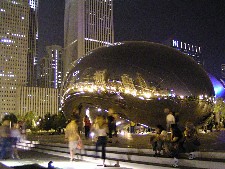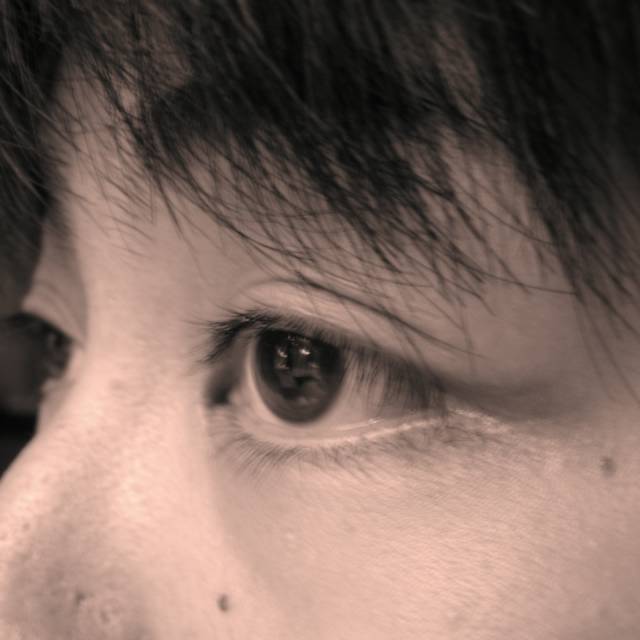keep the art in our hand
 Chicago has joined the bandwagon of copyright frenzy--now the entire Millennium Park is copyrighted, so anyone who wishes to photograph any part of the Park for commercial purposes has to buy a permit to do so. Near the end of last year, my better half witnessed a couple of people with cameras mounted on tripods being harassed by a police officer on one of those segways at the Park, and had been wondering about the incident, but the mystery is finally solved--in a somber way. Apparently the officer took the existence of the tripods to be an evidence of the people taking professional pictures for commercial purposes, the negation of which none of us is capable of proving (No one can prove a negation).
Chicago has joined the bandwagon of copyright frenzy--now the entire Millennium Park is copyrighted, so anyone who wishes to photograph any part of the Park for commercial purposes has to buy a permit to do so. Near the end of last year, my better half witnessed a couple of people with cameras mounted on tripods being harassed by a police officer on one of those segways at the Park, and had been wondering about the incident, but the mystery is finally solved--in a somber way. Apparently the officer took the existence of the tripods to be an evidence of the people taking professional pictures for commercial purposes, the negation of which none of us is capable of proving (No one can prove a negation).
It is certainly understandable if an artist gets infuriated to find someone else complying a big book of photos of his/her work without permission (and making money on that). And so far the ban of unauthorized photographing of the Millennium park is limited to the ones for commercial usage, which excludes most of us casual snapshot-takers. However, with copyright, they could block us from taking ANY kind of pictures at the park, for as far as the copyright law is concerned, the purpose of reproduction does not matter. It is simply not fun to see an inspiring "public" art and not be able to take pictures of it. But the problem is not that simple.
The city is definitely not sending a positive message to tourists from all over the world, which it desperately wants--the very purpose of building the shiny object was to attract tourists. There are considerable number of amateur photographers who care the quality of their photos enough to use tripods and conspicuous semi-professional cameras, who will probably fall victim of suspicious look and possibly annoying questions from security guards and police officers. What they would tell back home about Chicago's hospitality, I would not want to imagine. Surely neither would the tourism bureau of the city.
There are more grey areas to the entire copyright protection, concerning the nature of art and culture. They say one cannot take a picture of the copyrighted bean. Then what if I oil-painted an extremely true-to-life rendition of it? Isn't it a reproduction? What if the shiny thing inspired me to write a greatly visual poem about the bean? Is it a reproduction? They might say that those are interpretations of the bean, not mere reproductions (which is very true). Then what if I came up with a sharply original compositional photography in which a part of the bean plays an important role? Isn't it an interpretation of an existing piece of art?
These questions lead us to the very nature of any form of art, be it photography, painting, sculpture, music, fiction, poetry, film, and all the other forms that currently fail to come to my mind. A large and important part of art is the fact that it is a digestion, interpretation, and (when successful) sublimation of the preceding pool of all the human culture. No artist is free from debt to predecessors, which is not a curse but a blessing. The basic idea of copyright, which is to keep a piece of art (one might say that the "cloud gate" of the Millennium Park does not fall into this privileged category, but that is another matter), from going into the public pool of references from where other pieces of art sprout, not only discourages artists but also seriously undermines the accumulation of human heritage, a tremendous resource open to everyone. Without that open resource, our civilization must eventually come to a halt. The civilization, or our culture, has been a cumulative process in which newer generations absorb and then advance (or sometimes defy) the accomplishment of the former generations. The greed to privately possess not only the physical piece of art but also all the possibility it could open up for the humanity (which is what the current copyright frenzy is all about) is a grave harm to the cumulative process.
A world where a photographer cannot have an artistic dialogue with a sculptor by responding to the latter's work with an origial new take on the work in question is not the world where art thrives. That world is not an exciting world to live in--inspiring maybe, but the inspiration only entails frustration, for it does not allow to have an outlet in that world. I do not want this world to be turned into that world by a few.
drop of mercury
Originally uploaded by uBookworm.



0 Comments:
Post a Comment
<< Home